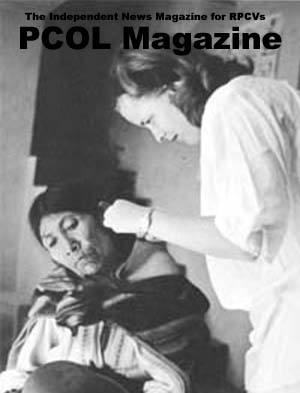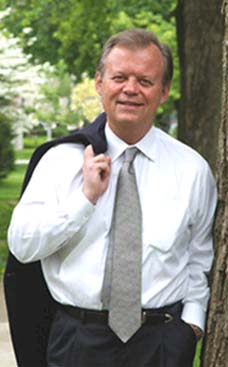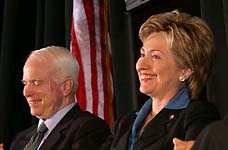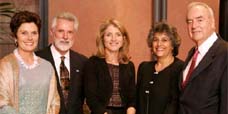
Why so few computer scientists and engineers join the Peace Corps is unclear. Perhaps it's because most technologists are trained in environments that require a lot of infrastructure and support in order to push through to the next discovery. It's hard to break new technological ground in a subsistence village. Another factor could be that there's a very well oiled path from the university into the high-tech job sector. Most people who start down that path stay on it.
296,p1.html, Efforts to find Peace Corps-like roles for technologists gain momentum
A Technology Corps
Efforts to find Peace Corps-like roles for technologists gain momentum.
By Michael Hawley
It was 2:00 a.m. on October 14, 1960. Ten thousand students were waiting in front of the student union building at the University of Michigan. As the weary candidate climbed the steps, the audience began chanting his name.
Senator John F. Kennedy had just flown in from New York, straight from a television debate with Vice President Richard Nixon. He spoke to the students off the cuff, delivering a speech that in just a few sentences would launch the Peace Corps. "How many of you who are going to be doctors are willing to spend your days in Ghana? Technicians or engineers, how many of you are willing to work in the Foreign Service and spend your lives traveling around the world?"
Nobody knows why Kennedy picked that moment, in the middle of the night on a college campus in the Midwest, to float the idea of the Peace Corps. But the effect was electric. The vision was that by learning to serve, a new generation would learn to lead. They would return from the field as stronger people, better not just from learning how to apply their talents, but from having learned much more about themselves and their place in the world. "There is not enough money in all America to relieve the misery of the underdeveloped world in a giant and endless soup kitchen," Kennedy later declared. "But there is enough know-how and knowledgeable people to help those nations help themselves."
In August of 1961, the first Peace Corps volunteers stepped onto the tarmac in Accra, Ghana. By the end of 1963, 7,300 volunteers were working in more than 40 countries; by 1966, the ranks had swelled to more than 15,000 in about 60 countries. And that, alas, was the peak. Under the pall of the war in Vietnam, the movement shrank.
The good news is that President Clinton "expanded" the Peace Corps-to 10,000. The bad news is that pitifully few Peace Corps workers have the kind of training that enables them to transfer the best ideas from Western labs into developing countries. Most volunteers have backgrounds in business, education, health care or ecology. A thin slice of the pie, about four percent, falls into the category of "other." And in that sliver you find technologists. It's a hugely disappointing minority.
Why so few computer scientists and engineers join the Peace Corps is unclear. Perhaps it's because most technologists are trained in environments that require a lot of infrastructure and support in order to push through to the next discovery. It's hard to break new technological ground in a subsistence village. Another factor could be that there's a very well oiled path from the university into the high-tech job sector. Most people who start down that path stay on it.
There are, however, rays of hope. One fledgling approach that directly addresses the "four percent problem" is Geekcorps (www.geekcorps.org). Launched by Ethan Zuckerman, who cofounded the successful Web service company Tripod, Geekcorps sends SWAT teams of technologists into the field to give the world's poorest people access to the Internet. The Geekcorps folk work with local communities to build the infrastructure needed to bootstrap local businesses. In an interesting echo of the Peace Corps, this outfit too began in Ghana. In fact, that's where the idea first came to Zuckerman: he went there on a Fulbright scholarship in 1993.
Geekcorps volunteers spend four months on the ground in developing nations, working to help partner businesses on a technical level. This corps of people and backers is largely drawn from the pool of successful U.S. technocrats. One volunteer, for example, came from the management and technology consulting firm Accenture, where she became an advocate for more corporate involvement in developing-world efforts. The firm now has several initiatives looking at how developing nations can embrace information technology to achieve economic growth. Getting a taste of the reality in Ghana, through one of its employees, translated into boundless energy and fresh leadership for Accenture-and that energy is what keeps these companies thriving.
Often, through these experiences, new opportunities arise for both volunteers and their partners in developing nations. Armenia Nercessian de Oliveira was a United Nations official for 16 years. Working in hardship countries, she saw many beautiful local handcrafts and was struck by what happened to them en route to the world market. In Africa, she saw handcrafted masks being sold for $15; back in the States, Bloomingdale's would sell the same mask for $300. Enter Novica United, founded by Nercessian with her daughter and son-in-law. Novica applies an Amazon-like approach to the marketing and distribution of local handcrafts from around the world. By connecting local offices in dozens of countries to the Internet, Novica has organized a vast online catalogue of goods created by thousands of regional artists. These items can then be sold directly to consumers at far below Bloomingdale's prices, returning a much greater profit to the artists.
For the recipient, each little gift, each product Novica ships, is a key that opens a doorway to another part of the world-a tangible, evocative connection to a living artisan, a person with a name, face and life story. Novica profits because its networked approach eliminates legions of middlemen. At the same time, the company is promoting a new kind of savvy eco-consumerism. This is a "good karma" company par excellence.
Novica's business, if it succeeds, could help conserve indigenous crafts and cultures. Like Geekcorps, it is pursuing a path that heightens public awareness, enriches communities, elevates tastes and deepens sensibilities. As technology evolves, it is important, and I would argue critical, to be able to hold in one hand an ingenious handmade toy from Ghana and in the other some sort of beeping, blinking, battery-powered, computer-infused techno-toy. Pondering the difference between the two will help us come to grips with what sorts of artifacts we want to surround ourselves with and why.
In my last column, I argued how vital it is for scientists and technologists to get into the field and immerse themselves in reality, up to their eyeballs in different ecologies, different cultures, different ways of thinking and doing. Now more than ever, the world is our laboratory. We are connected to each other through a fresh matrix of instant communication and easy travel. Burgeoning masses of people are constantly transforming the world. Humans have changed the climate, reshaped the land, harnessed rivers and extinguished species. Science gives us tools to change the world in incredible ways and at a frightening pace. But it can also help us restore some of what has been lost; it is also our compass for navigating the future. The question is: Who knows how to wield that compass?
The answer cannot come solely from scientists who have lived their lives in a lab. It must come from a new generation of technologists who have an active, firsthand sense of the world: scientists who know what the spirit of service means because they have served; engineers who have not just a textbook understanding of a problem, but who have had liberating experiences in settings that range from inner cities to outer wildernesses; inventors who know not only how to invent things, but how the processes of invention can help nourish a healthy, sustainable community.
The idea of dispatching volunteers with technological expertise to different parts of the world is gaining momentum. The MIT Media Laboratory, in collaboration with Harvard University's Center for International Development, recently launched a consortium called "Digital Nations." The consortium aims at bringing a broad set of next-generation technology projects, from e-commerce to health technology, to people in developing regions. The U.S. Department of State formed the Global Technology Corps, which enlists volunteers to share their skills in a number of areas, such as Web development or information science, with people around the globe. The leaders of the G8 (major industrialized countries) formed the Digital Opportunity Task Force to work on bridging the digital divide. Venture groups from Softbank to the World Bank are actively spurring new economic activity in developing regions.
This is encouraging news, but there's a long way to go. Right now, only seven graduates of MIT and four from Caltech are enrolled in the Peace Corps. And that just won't do.















